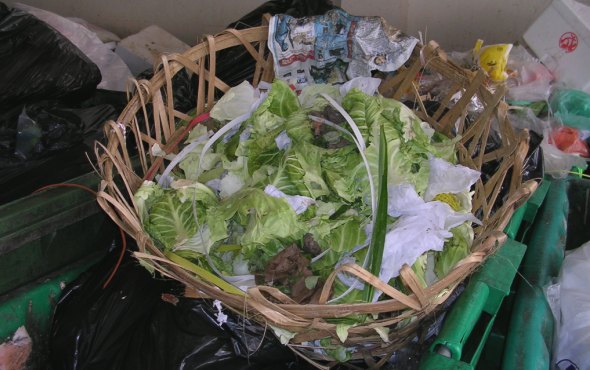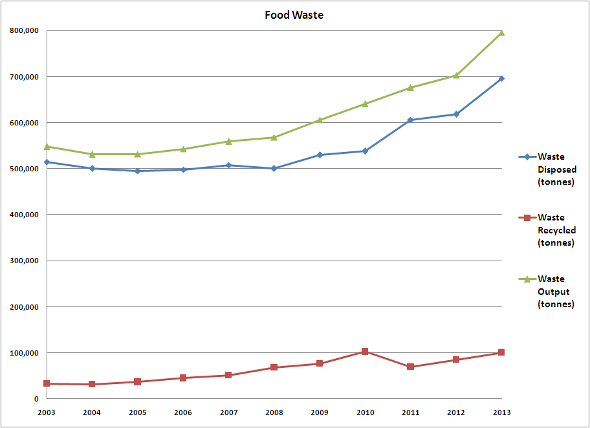We have been running the Save Food Cut Waste campaign since Nov 2012. There is now more awareness about food waste in Singapore and we have been getting several enquiries from the public who are concerned about food waste.
To address some of the concerns on food waste, let’s take a closer look at food waste generated, the causes, ways to reduce food waste, key barriers, and our proposed action plan to tackle food waste.
Food Waste in Singapore
Over the last 10 years, the amount of food waste generated in Singapore has increased by 45%. In 2013, the amount of food waste generated reached an all-time high of 796,000 tonnes and only 13% of it was recycled.
In light of this food waste problem and to tackle food security concerns, the government formed the Inter-Ministry Committee on Food Security (IMC-FS) in 2012 to coordinate and look into holistic measures to mitigate Singapore’s food security risks and vulnerabilities. The IMC-FS will look into boosting the food industry production capacity and resilience, and reducing food wastage.
The food waste reduction recommendations by IMC-FS included:
- Develop a comprehensive public education outreach programme
- Implement mandatory food waste reporting by large commercial premises
- Develop guidelines for food manufacturers and retailers to minimise food waste
- Promote research and development (R&D) on food waste reduction and recycling
Causes of Food Waste in Singapore
Food waste in Singapore might be generated from the following sectors due to various reasons:
Farmers
- Harvest loss due to pest and improper storage
- Filtering of imperfect food
Manufacturers
- Loss from poor production process and management
- Loss from improper storage and packaging
- Scraps from production process
Distributors
- Loss from improper stock management and storage
- Filtering of imperfect food
- Damaged products
- Unsold food products
Retailers (including supermarkets, wet markets and bakeries)
- Loss from improper stock management and storage
- Filtering of imperfect food
- Damaged food products
- Unsold food products
Food and Beverage Outlets (including restaurants, hawker centres, food courts, hotels and caterers)
- Loss from improper stock management and storage
- Filtering of imperfect food
- Large food portions resulting in unfinished food
- Overcooking or poor cooking skills
- Scraps from cooking
- Not allowing takeaways for leftovers
Consumers and Households
- Overbuy due to lack of planning when shopping
- Loss from improper storage or expired products
- Leftovers from food dislikes or large food portions
- Overcooking or poor cooking skills
- Scraps from cooking
Ways to Reduce, Redistribute and Recycle Food Waste in Singapore
Here are some possible ways to reduce, redistribute and recycle food waste:
Food Reduction for Individuals and Households (read more from our campaign Save Food Cut Waste)
- Learn about food sources
- Grow your own food
- Plan what to buy
- Store and handle food properly
- Cook and order just enough
- Cook your leftover food
Food Reduction for Businesses and Organisations
- Support local food
- Implement proper food management policies
- Accept cosmetically imperfect food
- Improve distribution and storage
- Have menus with smaller portions
- Ensure proper storage and refrigeration
- Improve cooking habits and methods
- Sell unsold food at discounts
Food Redistribution
- Give to food bank and charities (e.g. Food Bank Singapore, Food From the Heart, and Willing Hearts)
Food Recycling
- Start food composting using various methods such as aerobic composting, vermicomposting, Bokashi composting, or dehumidification
- Make garbage enzyme
- Install food digestion system to produce compost or water
- Explore anaerobic digestion plants
- Process into animal feed or new products
Key Barriers to Reducing Food Waste in Singapore
We have identified 4 key barriers to food waste reduction that needs to be resolved:
1) Lack of Government Policies and Direction
- No regulations and targets on reduction of food waste
- Not much data and information on food waste
- No campaign on food waste
2) No Clear Incentives and Pressure for Businesses to Take Action
- No pressure from government, consumers or NGOs
- Lack staff education and training on reducing food waste
- Not clear about savings from food waste reduction or recycling
- No economically feasible options for food waste recycling
- Face difficulties in process, infrastructure or manpower to sort food waste
- Worry about liabilities or brand image for food waste redistribution
3) Consumers and Households Are Not Sure on Why and How to Reduce Food Waste
- Lack information, know-how and reasons for reducing food waste
- Face difficulties in food waste sorting and redistribution
- No clear options for food waste recycling
4) Lack of Third-Party Recycler for Food Waste
- No clear policy or direction from the government
- Face difficulties in food waste sorting
- Not viable to set up commercial large-scale anaerobic digestion plants (afraid of failure like IUT Global or future competition from the government’s Integrated Waste Management Facility)
- Not clear on value and demand of end products
Proposed Action Plan for Food Waste in Singapore
Based on the key barriers above, we recommend the following action plan for food waste reduction in Singapore:
1) Set Clear Government Direction and Launch Cross-Sector Partnership
- Launch a cross-sector partnership initiative for food waste reduction, involving the government, food businesses, and NGOs
- Set a voluntary target for food waste reduction and recognise companies that meet the target
- Conduct food waste audits for different sectors to get more data
- Start food waste campaign and communications
- Provide education workshops for companies on best practices for food waste reduction
2) Minimise Edible Food From Being Disposed
- Introduce guidelines or Good Samaritan Act on unsold food donation and redistribution
- Provide recognition or tax incentives for companies that donate unsold food
- Encourage companies to sell soon-to-expire food items at discounts
- NGOs can add pressure on companies
- Provide a mobile app that indicates where free leftover food is available or soon-to-expire food is sold at a discount (for buffet events, F&B outlets and supermarkets)
3) Encourage Food Waste Recycling for Food Businesses and Communities
- Allow food companies in the same location to share a common aerobic or anaerobic digester for food waste, and apply for NEA’s 3R Fund together (if an individual company does not meet the criteria on waste amount)
- Start a pilot test to implement a community aerobic or anaerobic digester with food waste collection from households
What do you think of the proposed action plan to tackle food waste in Singapore? Is your food business taking steps to reduce food waste? Share your thoughts with us, thanks!



Hi eugene,
I had recently completed a food waste management project with some initiatives in line with your proposed plans. How do you plan to go about initiating them?
Josh
Thanks Josh, drop me an email at eugene@greenfuture.sg and do share more about your project.
Hi eugene,
What are the current measures Singapore has taken to help solve this problem specfically?and are there any proposed plans?
Thanks,
Kenny
I think that with good planning of the meals and the products which should be bought the amount of food waste will decrease. And there is always an option to make your own compost from the leftovers!
Hi there,
Personally, I am very interested in tackling the issue of disposing edible foods (simply because they are produced way more than was demanded) among all the rest of the other issues with regards to food wastage. I am currently thinking of working towards a plan that can help tackle this area of food wastage because it pains me to see edible foods being thrown away as if they were worthless. Let me know if there are any ongoing plans/initiatives that you have and require help for them. I will be more than willing to help.
Regards,
Clara
Thanks Clara for your interest, do check out http://www.savefoodcutwaste.com and we have plans later for an outreach campaign. Drop us an email at eugene@greenfuture.sg, thanks.